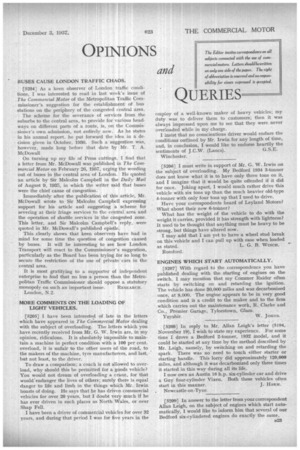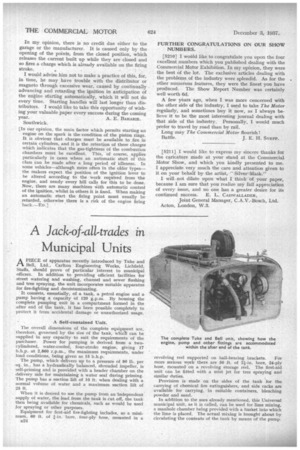OPINIONS
Page 21

Page 22

If you've noticed an error in this article please click here to report it so we can fix it.
and
QUERIES
BUSES CAUSE LONDON TRAFFIC CHAOS.
[5204] As a keen observer of London traffic conditions, I was interested to read in last week's issue of . The Commercial Motor of the Metropolitan Traffic Commissioner's suggestion for the establishment of bus
stations on the periphery of the congested central area. The scheme for the severance of services from the suburbs to the central area, to provide for various head ways on different parts of a route, is, on the Commis sioner's own admission, not entirely new. As he states in his annual report. he put forward the idea in a de cision given in October, 1936. Such a suggestion was, however, made long before that date by Mr. T. A. McDowall
On turning up my file of Press cuttings, I find that a letter from Mr. McDowall was published in The Com mercial Motor on February 26, 1937, urging the weeding out of buses in the central area of London. He quoted an article by Sir Malcolm Campbell in the Daily Mail of August 9, 1935, in which the writer said that buses were the chief cause of congestion.
Immediately after the publication of this article, Mr. McDowall wrote to Sir Malcolm Campbell expressing support for his article and suggesting a scheme for severing at their fringe services to the central area and the operation of shuttle services in the congested zone. This letter, and Sir Malcolm Campbell's reply, were quoted in Mr. McDowall's published epistle.
This _clearly shows that keen observers have had in mind for some time the question of congestion caused by buses. It will be interesting to see how London Transport will react to the Commissioner's suggestion. particularly as the Board has been trying for so long to secure the restriction of the use of private 'cars in the central area.
It is most gratifying to a supporter of independent enterprise to find that no less a person than the Metropolitan Traffic Commissioner should oppose a statutory monopoly on such an important issue. RESEARCH. London, N.2.
MORE COMMENTS ON THE LOADING OF LIGHT VEHICLES.
[5205] I have been interested of late in the letters which have appeared in The Commercial Motor dealing with the subject of overloading. The letters which you have recently received from Mr. G. W. Irwin are, in my opinion, ridiculous. It is absolutely impossible to maintain a machine in perfect condition with a 100 per cent. overload, it is unfair to the other users of the road, to the makers of the machine, tyre manufacturers, and last, • but not least, to the driver.
To draw a comparison; a coach is not allowed to overload, why should this be permitted for a goods vehicle? You would not dream of overloading a crane, for that would endanger the lives of others; surely there is equal danger to life and limb in the things which Mr. Irwin boasts of doing. He says that he has driven commercial vehicles for over 20 years, but I doubt very much if he has ever driven in such places as North Wales, or over Shap Fell.
I have been a driver of commercial vehicles for over 32 years, and during that period I was for five years in the employ of a well-known maker of heavy vehicles; my duty was to deliver them to customers; then it was always impressed upon me to see that they were never overloaded while in my charge. I insist that no conscientious driver would endure the conditions outlined by Mr. Irwin for any length of time, and, in conclusion, I would like to endorse heartily the sentiments of J.C.W. (Lanes). G.S.F. Winchester.
[5206] I must write in support of Mr. G. W. Irwin on the subject of overloading. My Bedford 1934 3-tonner does not know what it is to have only three tons on it, and I imagine that it would be quite offended if it did for once. Joking apart, I would much rather drive this vehicle with six tons up than the much heavier old-type 4-tonner with only four tons up that I used to drive.
Have your correspondents heard of Leyland Motors? What about their new 6-tonner?
What has the weight of the vehicle to do with the weight it carries, provided it has strength with lightness? It used to be thought that anything must be heavy to be strong, but things have altered now. may add that I am yet to have a wheel stud break on this vehicle and I can pull up with ease when loaded as stated. L. G. B. WINCH. Romford.
ENGINES WHICH START AUTOMATICALLY.
[5207] With regard to the correspondence you have published dealing with the starting of engines on the switch, I may mention that my Commer Raider often starts by switching on and retarding the ignition. The vehicle has done 30,000 miles and was decarbonized once, at 8,000. The engine appears to be in very good condition and is a credit to the maker and to the firm which carries out the maintenance work, R. Clarke and Co., Premier Garage, Tylorstown, Glam.
Ynyshir. W. JOHNS.
[5208] In reply to Mr. Allan Leigh's letter (5194, November 19), I wish to state my experience. For some time I drove a Bedford 2-tonner, 1932 model, and it could be started at any time by the method described by Mr. Leigh, namely, by switching on and retarding the spark. There was no need to touch either starter or starting handle. This lorry did approximately 120,000 miles, and although it was decarbonized only three times it started in this way during all its life.
I now own an Austin 16 h.p. six-cylinder car and drive a Guy four-cylinder Vixen. Both these vehicles often start in this manner. J. HARM. Newcastle-on-Tyne.
[5209] In answer to the letter from your correspondent Allan Leigh, on the subject of engines which start automatically, 1 would like to inform him that several of our Bedford six-cylindered engines do exactly the same.
In my opinion, there is no credit due either to the garage or the manufacturer. It is caused only by the opening of the points, from the closed position, which releases the current built up while they are closed and so Ares a charge which is already available on the firing stroke.
I would advise him not to make a practice of this, for, in time, he may have trouble with the distributor or magneto -through excessive wear, caused by continually advancing and retarding the ignition in anticipation of the engine starting automatically, which it will not do every time. Starting handle's will last longer than distributors. I would like to take this opportunity of wishing your valuable paper every success during the coming
year. A. E. BAHARIE. Southwick.
[In our opinion, the main factor which permits starting an engine on the spark is the condition of the piston rings. It is obvious that charges must be available to fire ,in certain cylinders, and it is the retention of these charges which indicates that the gas-tightness of the combustion chambers must be excellent. This, of course, applies particularly in cases where an aufomatie start of this class can be made after a long period of idleness. In some vehicles—although more often in the older types— the makers expect the position of the ignition lever to he altered according to the work required from the engine, and nearly every hill calls for this to be done. Now, there are many machines With automatic control of the ignition, whilst in others it is fixed. When making an automatic start the firing point must usually be retarded, otherwise there is a risk of the engine firing back.—En.]
FURTHER CONGRATULATIONS ON OUR SHOW NUMBERS.
[5210] I would like to congratulate you upon the four excellent numbers which you published dealing with the Commercial Motor Exhibition. In my opinion, they were the best of the lot. The exclusive articles dealing with the problems of the industry were splendid. As for the other numerous features, they were the finest you have produced. The Show Report Number was certainly well worth 8d.
A few years ago, when I was more concerned with the other side of the industry, I used to take The Motor regularly, and sometimes buy it now, as I always believe it to be the most interesting journal dealing with that side of the industry. Personally, I would much prefer to travel by road than by rail.
Long may The Commercial Motor flourish !
Battle. J. E. H. SNEPP.
[5211] I would like to express my sincere thanks f or the caricature made at your stand at the Commercial Motor Show, and which you kindly presented to me. I appreciate very much the care and attention given to it on your behalf by the artist, " Silver Mask."
I will not dilate upon what I think Of your paper, because I am sure that you realize my full appreciation of every issue, and no one h.is a greater desire for its continued success. E. L. CADWALLADER, Joint General Manager, C.A.V.-Bosch, Ltd. Acton, London, W.3.


































